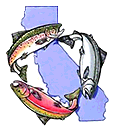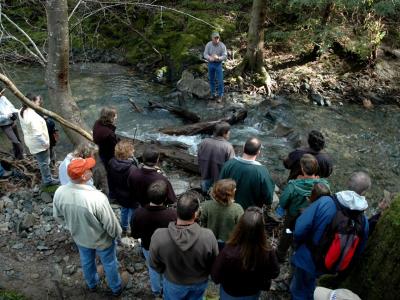The 25th Annual Salmonid Restoration Conference took place in Santa Rosa and was focused on Celebrating a Generation of Salmonid Restoration and Recovery.
Over 500 watershed enthusiasts migrated to the North Coast to attend the 25th Annual Salmonid Restoration Federation Conference in Santa Rosa, California. This silver anniversary conference was entitled, “Celebrating a Generation of Salmonid Restoration and Recovery,” and highlighted the evolving restoration field and global issues that are affecting salmonid recovery. The conference included full-day workshops on dam removal and FERC relicensing, fish passage barrier removal tools, and estuary and lagoon restoration. Field tours visited sustainable grazing sites in southern Sonoma and western Marin counties, vineyards with salmonfriendly agricultural practices, Dutch Bill Creek watershed, steelhead habitat restoration projects on Upper Sonoma Creek, bioengineering and in-stream restoration projects, a tour from the headwaters to the mouth of Austin Creek watershed, as well as a short tour of urban creek restoration projects in the Prince Memorial Greenway.
Concurrent sessions focused on environmental, biological, and policy issues that affect Salmonid habitat restoration and recovery of native fish populations including North Coast water diversions, Coho Recovery efforts in California, the economic, cultural and recovery impacts of fisheries closures, coastal watershed planning and restoration, salmonid and watershed environmental education, Salmonid recovery downstream of large reservoirs, measuring watershed condition and management performance, fluvial geomorphology, assessing Best Management Practices, and regional land use planning and implementation strategies in aquatic conservation.
The plenary session featured prominent keynote speakers including UC Davis Fisheries Professor Peter Moyle who addressed “Climate Change and the State of California Salmonid Recovery Efforts,” Nat Scholz from NOAA Fisheries who discussed coho recovery in light of toxicity in urban streams, Freeman House, author of Totem Salmon, who addressed grassroots watershed efforts in the face of global warming, and Brock Dolman who provided a local perspective on watershed restoration. Seth Zuckerman, editor of Salmon Nation, facilitated the Plenary.
Other highlights of the conference included the Wild and Scenic Environmental Film Festival, SRF’s annual meeting, a poster session and reception, and a cabaret, a Copper River salmon banquet, and a lively dance party with Latin dance band, Sambada.

